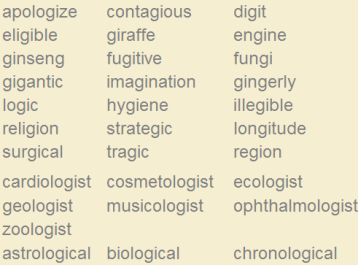Beware phonics amateurs
1 Replies
I've been busy working on my spelling lists, but it can get a bit boring going through the dictionary and thinking about all the allowable sound combinations, so I'm sometimes tempted to take shortcuts by looking at other spelling lists on the internet. Perhaps I've listened to too many Tom Lehrer songs (you can listen to that while you read, can't you?!?).
For example, today I am looking for extra words with the letter g representing both the sound "g" as in gate, geese, girl, goat and gum, and the sound "j" as in gaol, gel, gist and gym.
After lunch and before my coffee kicked in, I googled "soft g sound" and found a page with a long spelling list. A lot of them were words in which the single letter g does in fact represent the sound "j", for example:
|
gem |
gym | cage | giant | margin | agent |
| gel | gyp | wage | digit | logic | angel |
| germ | age | huge | gentle | tragic | legend |
However, quite a lot of them had the spelling "ge" representing this sound:
| bilge | cringe | forge | fringe | gorge | hinge |
| large | plunge | singe | urge | challenge | discharge |
| dislodge | emerge | enlarge | orange |
This is typically how the sound "j" is spelt after two-letter vowel spellings, or after consonants (though it's also at the start of the name "George").
A few other words had the spelling "dge", which is typically used after one-letter "checked" or "short" vowels:
| bridge | dodge | grudge | nudge | fledge |
| sledge | smudge | cartridge | knowledge |
Some also had the spelling "gi" for the target sound:
| legion | region | hygiene | religion | plagiarize | contagious |
Only American spellings like "plagiarize" were used:
| paleontology | etiology | digitize | apologize |
Here in Australia, we read stuff from both the UK and US, so it's a good idea to teach both UK and US English variations of a word, to make sure learners know they both exist, and don't think one is a mistake.
| palaeontology | aetiology | digitise | apologise |
However, a list focusing on "soft g" is not the place to do this.
I thought one word, "volcanology" was misspelt, but my Concise Oxford says it is a variation of "vulcanology". I don't think the site's well-meaning webmastress (sic) ever watched Star Trek.
The spelling list also included quite a few very long words, though I'm not sure why you'd study these at the same time as "gel" and "gist::
| cardiologist | musicologist | ornithologist | ideological | meteorological | etiological |
| mythological | neurological | pathological | seismology | meteorology | climatology |
Some of the long words contained spellings that are much less common and more difficult than "soft g", like Greek "ch" and "ph", and the "ps" in "psycho":
| archeological | chronological | technological | ichthyology |
| phonology | physiological | pharmacology | ophthamologist |
| psychologist | psychological |
Three words included the letter "g" twice, once following the target pattern, and once not following it:
| engage | gigantic | ginseng |
I also found two words on the "soft g" list that don't contain the target sound at all, at least not in English as spoken by myself and our receptionist. I've checked the Concise Oxford dictionary and it agrees that the sound in the following words is "g" as in "get" not "g" as in "gel":
| fungi | longitude |
I had to look a few of the list's words up in the dictionary myself to confirm their exact meaning:
- elegy: 1. a song of lament, esp. for the dead (sometimes vaguely used of other poems) or 2. a poem in elegaic metre.
- entomologist: a person who studies insects, and etymologist: a person who studies word origins.
- doxology: a liturgical formula of praise to God.
- gyroscope: a rotating wheel whose axis is free to turn but maintains a fixed direction unless perturbed, esp. used for stabilisation or with the compass in an aircraft, ship, etc.
- panegyrical: a laudatory discourse or eulogy.
Maybe people use these words in ordinary conversations in the place in the USA where this website was written, but here in Australia you don't hear them so much. Best to leave words learners probably don't know off spelling lists.
The words "cosmetologist", "astrological" and "parapsychology" all made it onto the spelling list, but the words "cosmologist" and "psychology" didn't.
Don't trust the internet on phonics
The internet is a great big democratic swamp, where enthusiastic and well-meaning amateurs write all sorts of inaccurate stuff. In phonics, they often take a little bit of lay knowledge and extrapolate it in weird and wonderful directions.
At least when materials get filtered through publishing houses, someone else looks at them, hopefully someone who knows what they are talking about (though as I said in this earlier post, a lot of what gets published as "phonics" is fairly suboptimal).
So please be careful when you're out there on the internet surfing for spelling lists, and check the credentials of those publishing information and materials. Be especially wary of any sites that assert "spelling is simple" or say "x is always y", rather than "x is usually y" – there are clear spelling patterns, but there are almost always a few exceptions.
Right, I've had a good vent, better get back to work on those spelling lists.



Thanks for a great site. Am now looking forward to the learning adventure with my kids when they show interest. keep it coming!